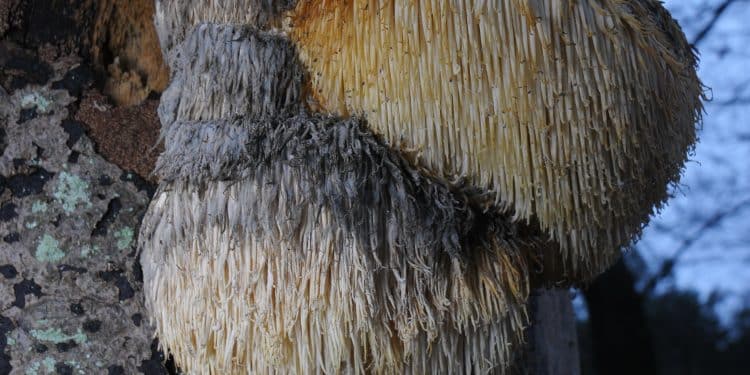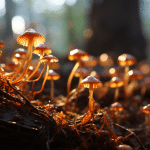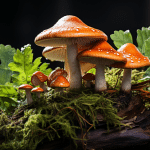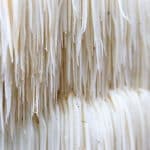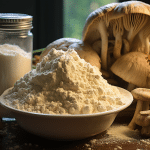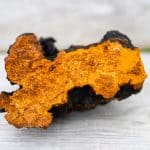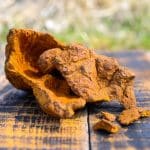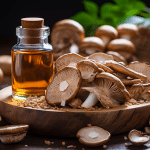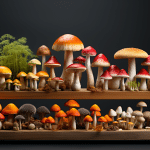The lion’s mane mushroom is a species known by several names. Its scientific name, Hericium erinaceus, is the official way that mycologists, scientists who study mushrooms, refer to it. It is also known as Yamabushitake in Japanese, or as lion’s mane in English.
Alternatively called bearded tooth mushroom or pompon mushroom because of its highly-textured surface, lion’s mane mushrooms are native to mountains of Northeast Asia, and can be found throughout Europe and North America. An important species in the traditional medicines of China, Korea, and Japan, where it has been used for thousands of years, lion’s mane has gained in popularity more recently, partly because of a different monicker.
Dubbed a “smart mushroom” for its support for cognitive functions and neurological health, lion’s mane properties are getting worldwide attention for its outstanding potential for supporting the brain. Examining lion’s mane health properties can help you decide whether this smart mushroom is something you need in your life.
Lion’s Mane Mushroom Properties
Whether you are looking for ways to turbocharge your workday, boost focus for those days you cannot remember where you left the keys in the car (only to discover they are right there in your hands), combat brain fog, boost your focus and positivity, or spur creativity and mental clarity, here are some of the best properties of lion’s mane, and ways to integrate this powerful functional mushroom into your routine.
It Is One of the Healthiest Functional Foods
Lion’s mane mushrooms are edible, and can be used in a variety of recipes. When found fresh and steamed, some people liken their flavor to seafood, particularly crab or lobster.
But, far from being merely a tasty dish, Lion’s mane has been classified as a functional mushroom, a food that provides much more than just a basic nutritional benefit. While lion’s mane may provide protein, complex carbohydrates, vitamins, and minerals in your diet, it also contains bioactive substances that support various cognitive functions and processes in your body.
In this capacity, regularly using lion’s mane can help your body work more effectively and stay in balance when faced with both internal and external stress. For this reason, many people are turning to supplements to get easy access to the properties of this functional food.
You can find our favorite capsules, powders, and tincture’s on the following pages of our website and learn more about each individually:
The Best Lion’s Mane Supplement
Lion’s Mane is A Potent Nootropic
Compounds which exert protective effects on the brain, supporting its natural cognitive functions, are called nootropics. Lion’s mane contains a wide variety of bioactive natural compounds, including Erinacine and Hericenone, which are known for their positive effects to cognitive health.
Because erinacines are found in mycelium, while hericenones are restricted to the fruiting bodies, getting the benefits of both can be accomplished only through consumption of an entire fungus product, which includes both parts of a mushrooms lifecycle. These essential nootropic compounds found in lion’s mane can pass through a protective blood-brain barrier.
They promote synthesis of NGF (nerve growth factor) and BDNF (brain-derived neurotrophic factor), chemicals with powerful biological activities. NGF and BDNF help to promote growth, repair, and normal function of neurons, the nerve cells that are the building blocks of our brains and nervous systems. These factors are essential to neuroplasticity, which is the creation of new neural pathways in the brain after an injury or disease.
Several studies concluded that supplementing lion’s mane supports cognitive functions and nerve regeneration in laboratory animals. One laboratory study demonstrated that lion’s mane promoted myelin production (a protective covering) on neural cells in tissue cultures of animals.
A study conducted in Japan concluded that lion’s mane had protective effects on learning and memory deficits in mice. A study conducted in Taiwan showed that mycelial extracts of lion’s mane, which contains erinacine, had therapeutic effects in rats suffering from brain injuries.
Extracts made from the lion’s mane fruiting bodies were administered to rats with peripheral nerve injuries. The mushrooms extract supported an early and fuller recovery of neural tissue than rats that did not receive it.
Limited studies were conducted on human subjects, but researchers concluded the compounds found in manes support healthy cognitive functions and mood. A randomized, controlled trial conducted in Japan found that men and women aged 50-80 years, given 3,000 mg of dried powdered lion’s mane every day, showed significant improvements in cognitive functions over those given placebo.
However, improvements were lost in four weeks after supplementation was stopped. Also conducted in Japan, a randomized, controlled trial of menopausal women showed better sleep quality and improved mood among women given cookies with powdered lion’s mane, as opposed to those given placebo. Research continues on the mechanisms of how the bioactive compounds in lion’s mane support healthy brain and nervous system functioning, with promise for future applications.
Antioxidant Properties
Lion’s mane, just like other mushrooms, has powerful anti-oxidant and anti-inflammatory properties. Antioxidants neutralize the free radicals that form inside our cells, protecting against oxidative damage. These properties are likely responsible for lions manes neuroprotective properties in the brain, but they also help to combat tissue damage caused by oxidative stress and inflammation in the entire body.
Immune Support
Lion’s mane, as well as other species of functional mushrooms, contains various phytochemicals, including polysaccharides like beta-glucan, prebiotic fiber, and digestive enzymes, which support immune health and promote healthy gut flora. Bioactive compounds in mushrooms modulate the immune system, supporting proper responses, but not overreactions. Researchers concluded that mushroom polysaccharides support the body’s own immune protection systems, which defend against colds, influenza, and other respiratory viruses.
The anti-inflammatory properties, however, moderate the immune response, improving allergy symptoms and soothing inflammation.
Additional Resources:
How do you make a lion’s mane mushroom tincture?
How do you use lion’s mane mushroom powder?
Updated 10/10/2022
